Glutathione The Master Antioxidant With Enormous Benefits
As we all understand how antioxidants play a significant role in detoxification, boosting immunity and optimizing overall health. Glutathione is an important and powerful endogenous antioxidant that is naturally present in every cell of the human body, in fact, it is present in all organisms in some amount. It is a key substance in detox pathways. Glutathione is considered a master antioxidant with enormous benefits including anti-ageing, tissue building, protein synthesis, immunity-boosting and many other vital body functions.
What Is Glutathione
Glutathione often called the “Master Antioxidant”, is a tripeptide that is composed of three amino acids: cysteine, glycine, and glutamic acid (glutamate). Glutathione is produced naturally in the liver. Having a suitable amount of glutathione is crucial for many body functions and protects our body from cell damage and oxidative stress.
It has various medical uses such as it detox chemicals in the liver, it is also important for immune health and delays cell damage, it also has amazing anti-ageing properties and works magic on your skin.
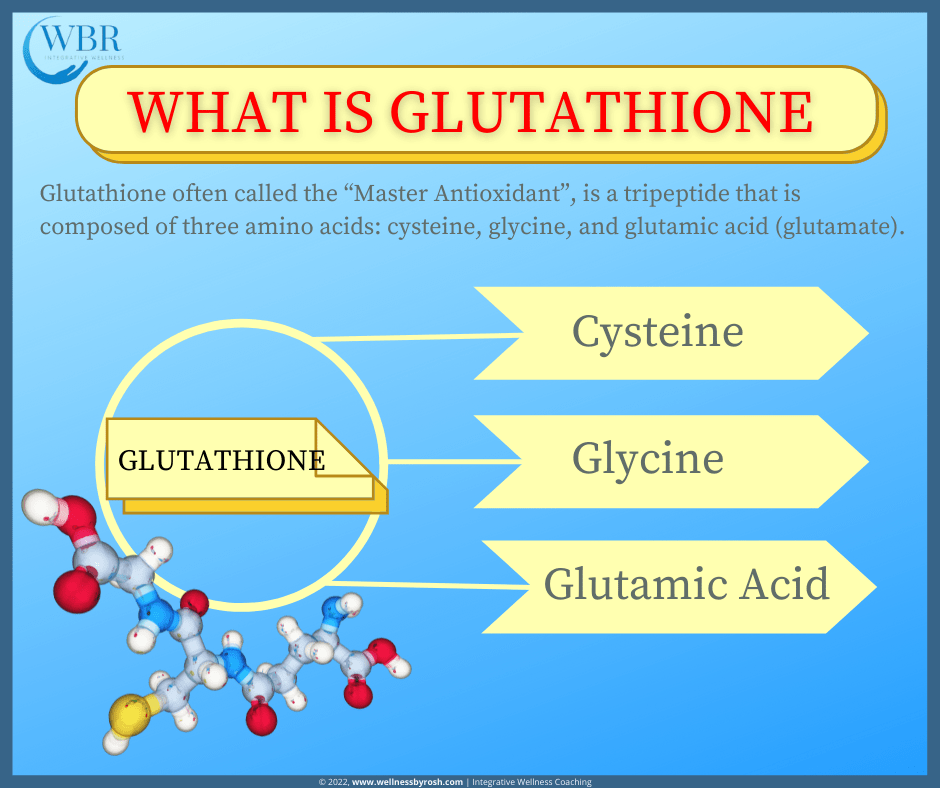
Different Form Of Glutathione
There are two different forms of glutathione:
- Reduced Glutathione (GSH / L-glutathione)- an active form
- Oxidized Glutathione (GSSG)- an inactive form

The Key Benefits OF Glutathione
1. The Master Antioxidant
Antioxidants protect your body from oxidative stress or free radicals that damage healthy cells and cellular DANs. Glutathione works as a master antioxidant and instantly neutralizes various oxidants such as nitric oxide, peroxynitrite, lipid peroxides and superoxides etc.
2. Improves Insulin Sensitivity
It is found that glutathione levels are associated with the age factor. As people age, glutathione production also decreases. Insulin resistance triggers lower glutathione levels.
Study shows that the patient with insulin resistance is fed with cysteine and glycine, a rich diet to raise glutathione level for two weeks, it also helps to decrease insulin resistance.
3. Detoxification
Detoxification is the process where the waste (toxins) gets collected and recycled inside the body. The detoxification process has three phases:
- Phase-1: All types of toxins and xenobiotics are partially processed inside the mitochondria through a specialized protein called cytochrome. But this is an incomplete process.
- The incomplete processing of toxins may produce dangerous free radicals.
- Phase-2: Partially depleted toxins of phase-1 are neutralised by enzymes.
- These enzymes use glutathione for this neutralizing process.
- Phase-3: The toxins get removed from the body mainly by the kidneys (urine) and liver (bile).
Without glutathione, the body can not neutralize and eliminate the toxins effectively.
4. Boosts Immune Function
Glutathione boosts our immune system to stay healthy and makes it ready to fight against infections. When many chronic infections such as Hepatitis, herpes virus, EBV etc. suppress the immunity, active glutathione (GSH) works to modulate the behaviour of immune cells and turn on the immunity.
5. Best Anti-Aging Supplement
Glutathione level in the body regulates the mitochondrial and cellular health, a high level of glutathione is responsible for the longevity of healthy cells and reduces the apoptosis (cell death), while a low level increases cellular death and causes ageing signs.
6. Cognitive Health
Some antioxidant like Glutathione plays a crucial role to detox the brain from oxidative damage and prevent from some cognitive disease including Parkinson’s, Alzheimer’s conditions, anxiety, and other brain-related diseases.
7. Reduces Inflammation
Inflammation is a chronic disease, elevated glutathione levels may lower the inflammation. Though for complete recovery you will have to address the root causes of your inflammatory condition.
8. Fight Against Autoimmune Disease
Chronic inflammation due to autoimmune disease can elevate oxidative stress. Autoimmune diseases such as celiac disease, Rheumatoid arthritis and lupus etc. autoimmune conditions attack the specific mitochondrial cells. Glutathione helps in eliminating free radicals and protects mitochondrial cellular damage. Glutathione also reduces oxidative stress by lowering the body’s immunological response.
9. Reduces Symptoms Of Parkinson’s Disease
Glutathione can help prevent oxidative stress that might impair dopamine neurons in Parkinson’s disease. The study found that people suffering from Parkinson’s disease have low glutathione levels in the brain. The disease can be prevented by boosting GSH levels in the body at an early stage.
10. Reduces Cell Damage In Hepatic Disease
Hepatitis, Non-alcoholic fatty liver disease, and alcohol consumption like conditions damage the liver cells. studies show that glutathione may help to treat fatty liver (NAFLD) because of its detoxification and antioxidant properties.
The Common Deficiency Symptoms Of Glutathione
Though glutathione deficiency is a serious condition, so it is crucial to recognize the symptoms of glutathione deficiency, some include:
- Abnormality of the immune system
- Abnormality of the nervous system
- Difficulty In managing a healthy weight
- Allergies
- Frequently catching cold and flu
- Chronic metabolic acidosis
- Hemolytic anaemia
- Pigmentary retinopathy
- Ataxia
- Autosomal recessive inheritance
- Psychotic mentation
- Spastic tetraparesis
How To Naturally Increase Glutathione Level In The Body
1. Consume Sulfur Rich Fruits& Vegetables (Allium Foods)
Sulfur works as a precursor to glutathione synthesis, which means the more you eat sulfur-containing foods, the more glutathione will produce in your body. Some sulfur-rich foods are:
-
- Leeks
- Onions
- Garlic
- Scallions
- Shallots
2. Increase The Intake Of VItamin-C
Vitamin C plays a crucial part in maintaining a healthy glutathione level. Consuming vitamin-C rich foods is a good way to increase the glutathione level in the body. Some vitamin C rich foods are:
-
- Citrus fruits ( oranges, gooseberry, sweet lime etc.)
- Strawberries
- Brussels sprouts
- Potatoes
- Peppers
3. Make Sure You’re Getting Adequate Quality Sleep
Lack of sleep can affect the healthy glutathione level in the body, on the other hand, getting good quality sleep on a regular basis may help to increase glutathione levels.
4. Stop Consuming Alcohol
Consuming alcohol drastically decreases the glutathione level in the overall body, specifically in the lungs. An excessive amount of alcohol may drop 80-90% of glutathione in the lungs themselves. Limiting alcohol intake can help to increase and maintain a healthy glutathione level in the body.
5. Include Milk Thistle In Your Diet
It is found the regular use of milk thistle may enhance the glutathione levels by preventing cellular damage. It is a good natural supplement that is very popular and safe to increase glutathione levels.
6. Regular Physical Activity To Boost Glutathione Levels
Regular exercise that should include a good combination of cardio and weight training may help increase glutathione levels. However, it is also crucial to understand that overtraining or exhausted workouts without rest and a healthy diet can deplete glutathione levels in the body.
7. Whey Protein
Consuming grass-fed whey protein can be a convenient option for your body to produce GSH. Gamma-glutamyl cysteine is present in the whey protein, which means two important components of glutathione, glutamine and cysteine are present that bypass the complicated first step to making glutathione in the cells.
8. Consume Foods That Are Naturally Rich In Glutathione
Eating glutathione rich food is always a good option to meet a healthy level of glutathione in the body as it may prevent oxidative stress. Some natural glutathione rich foods are avocado, spinach, okra and grapefruits etc.
9. Green Tea
Green tea and other detox teas are also a very effective and simple way to increase glutathione levels naturally. Green tea improves antioxidant status. But one should not drink more than 3-4 cups of green tea in a day.
10. Selenium
Selenium is a trace element that supports the production of antioxidant enzymes. It also crucial for glutathione synthesis. some selenium-rich foods are:
-
- Whole grains
- Dairy products
- Brazil nuts
- Mushrooms
11. Specific Spices
Some spices are very beneficial and have the potential to increase glutathione levels in the body.
-
- Black pepper
- Curcumin
- Turmeric
- Rosemary
- Ginger
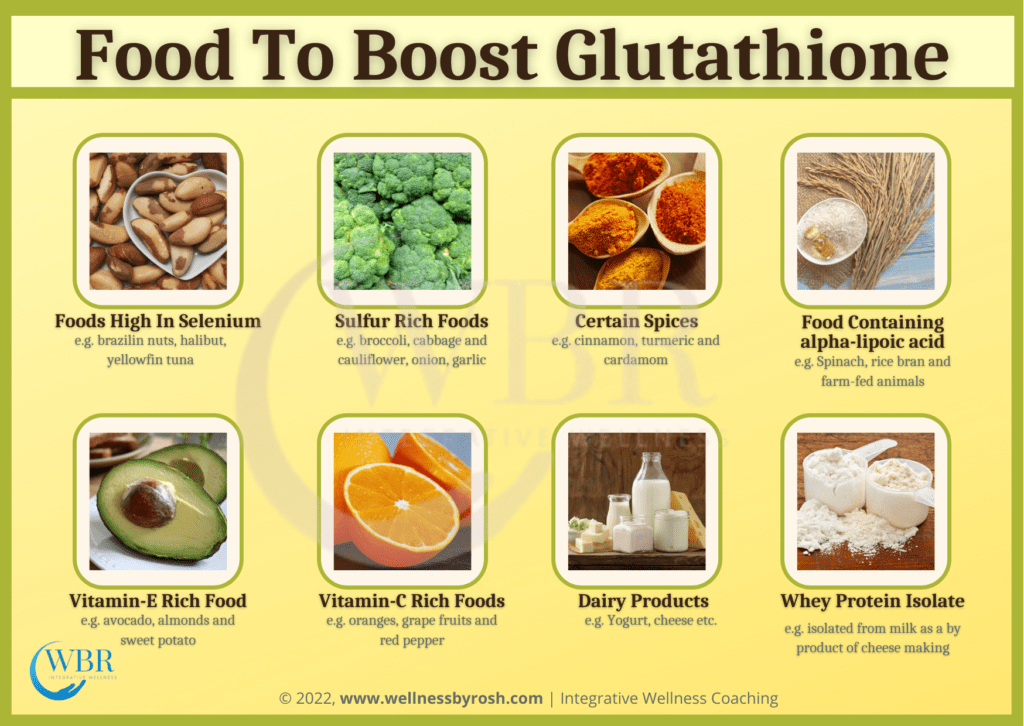
Food Sources Of Glutathione
- Avocado
- Asparagus
- Broccoli
- Tomato
- Spinach
- Okra
- Carrot
- Grapefruit
- Orange
- Cantaloupe
Supplement Guidelines
Generally, diet is the best way to increase the glutathione level, however, in some cases, such as people who do not digest sulfur-rich foods are not getting a sufficient amount of glutathione from the diet alone, you might consider taking a supplement.
It is important to know that the glutathione supplement is different from other supplements, it has to pass through the liver to be activated and get absorbed.
- Glutathione supplement can be taken orally in a plain powder form, Liposomal glutathione (400-800 mg/day) is a good example of oral supplementation. Sublingual reduced glutathione as another good option.
- Probiotics with a specific strain such as L.fermentum ME-3 are considered a good supplement as it contains both glutathione peroxidase and glutathione reductase that helps to increase glutathione production.
- Vitamin C & E- as antioxidants support glutathione to function properly.
- Vitamin B- Vitamin B1, B2, B6, B9 and B12 helps to maintain healthy glutathione level in the body.
- Selenium- Selenium (200mcg) or 2 soaked Brazilian nuts per day is a good supplement for maintaining a healthy level of glutathione as selenium increases plasma glutathione level.
- Magnesium- For the proper functioning of the enzyme gamma-glutamyl transpeptidase (GGT), magnesium is required. GGT enzyme actively participates in glutathione synthesis.
- Zinc- Zinc deficiency lowers the glutathione levels in the red blood cells (RBCs) but it is also crucial to know that because of its pro-oxidant property, high zinc can reduce the glutathione.
- Alpha-lipoic acid/R-ALA- is an antioxidant and it stimulates the enzyme involved in the synthesis of glutathione.
- NAC (N-Acetyl Cysteine)– replenishes glutathione as it can directly scavenge free radicals.
- Resveratrol– induces glutathione synthesis by activation of nuclear erythroid-related factor 2 and by decreasing oxidative stress.
-
Omega-3 fatty acid (2000 mg EPA+DHA in 3:2 ratio) supplementation increased brain glutathione.
Some Important FAQs
- Liposomal glutathione is the best form of oral supplementation for boosting glutathione.
- Lab markers for glutathione: Free Glutathione (GSH), Glutathione disulphide (GSSG) and GSH/GSSG ratio.
- Vitamin C, E, B1, B2, B6, B9, B12 and minerals selenium, zinc, magnesium are cofactors for glutathione production.
- Insomnia decreases glutathione level so getting enough rest on regular basis helps in boosting glutathione level.
- Glutathione contains sulphur molecules so sulphur rich diet increases natural production.
- Glutathione is the primary conjugation agent that binds with heavy metal mercury and helps in mercury detoxification.
- Avoid consuming alcohol and other beverages as it may interrupt the full absorption of glutathione supplements.
- People who are on anti-psychotic medication or chemotherapeutic drugs should not take glutathione tablets.
- Avoid taking glutathione supplements (inhaled GSH) if you are having asthma.
- Some mild side effects of taking glutathione supplements are abdominal pain, gas & bloating, loose stools and skin allergies like rash etc. But these side effects are very rare.
-
Use of glutathione reduces kidney toxicity for Intravenous (IV) chelation therapies.
People have different metabolism and body weight, which also impact the desired result. We always recommend consulting your medical practitioners before starting any supplements.
Conclusion
Glutathione is a master antioxidant, that is extremely good for health in many aspects including heart health, brain, immune and skin health. It is naturally present in the cells. We can maintain our natural glutathione level high by adopting some lifestyle changes such as healthy eating, quality sleep, stress management, well hydration and regular physical activities.
Supplementation can also help to maintain a good glutathione level we suggest always seeking your health care provider’s advice before making any major changes to your diet or lifestyle.

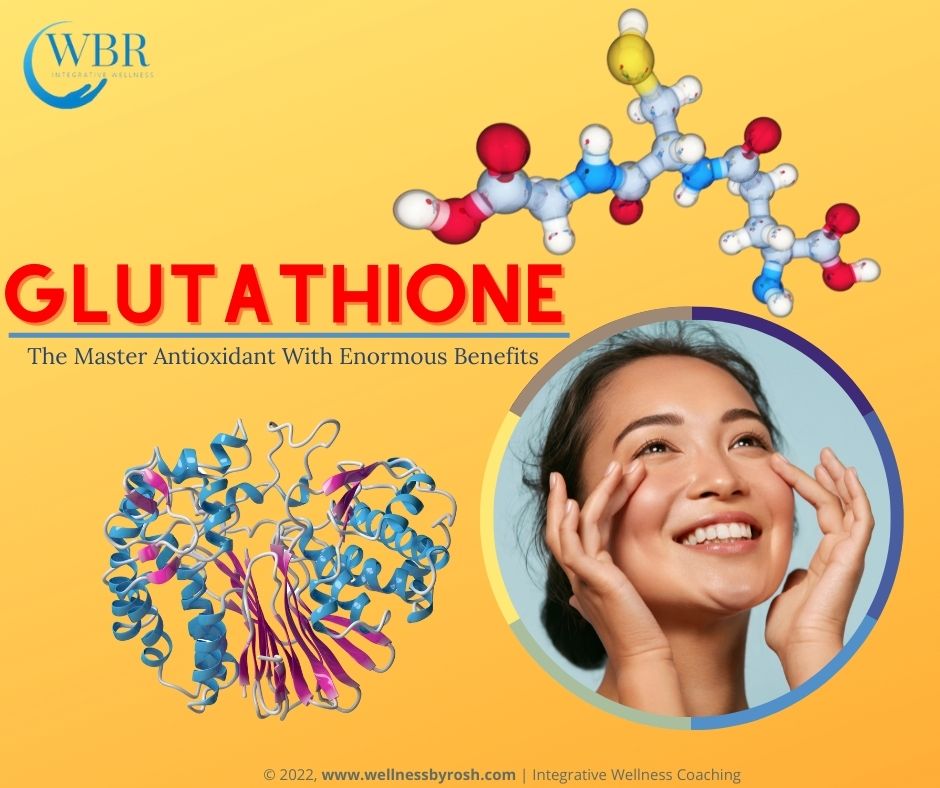


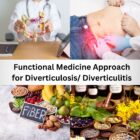

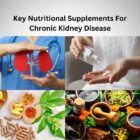



Karina Garcia, MD
12-May-22Thank you ! Great article !
Wellness By Rosh
12-May-22Thank you for your feedback. Appreciate your support.